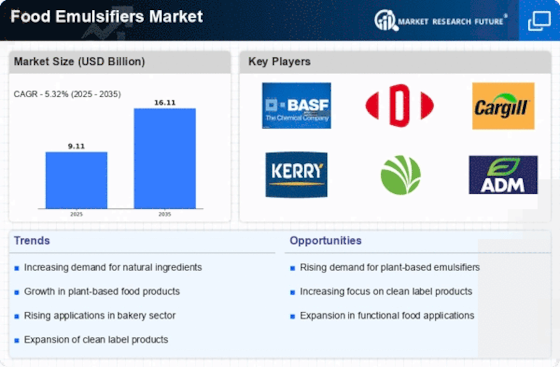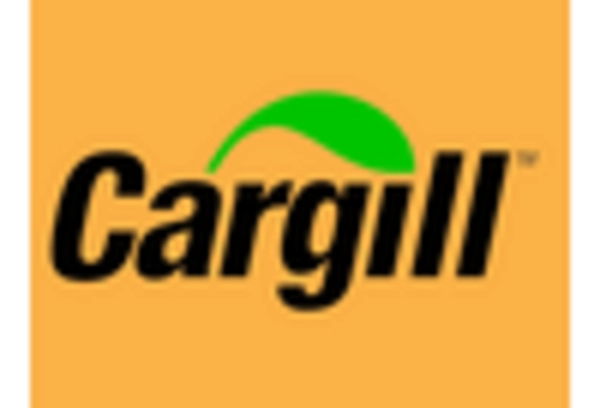- Food Emulsifiers Market By Application (USD Billion, 2019-2035)
- Bakery Products
- Dairy Products
- Sauces and Dressings
- Beverages
- Food Emulsifiers Market By Type (USD Billion, 2019-2035)
- Natural Emulsifiers
- Synthetic Emulsifiers
- Modified Starches
- Food Emulsifiers Market By Functional Benefit (USD Billion, 2019-2035)
- Stabilizers
- Thickeners
- Texture Modifiers
- Shelf Life Extenders
- Food Emulsifiers Market By End Use (USD Billion, 2019-2035)
- Food Industry
- Beverage Industry
- Pharmaceuticals
- Food Emulsifiers Market By Regional (USD Billion, 2019-2035)
- North America
- Europe
- South America
- Asia Pacific
- Middle East and Africa
North America Outlook (USD Billion, 2019-2035)
- North America Food Emulsifiers Market by Application Type
- Bakery Products
- Dairy Products
- Sauces and Dressings
- Beverages
- North America Food Emulsifiers Market by Type
- Natural Emulsifiers
- Synthetic Emulsifiers
- Modified Starches
- North America Food Emulsifiers Market by Functional Benefit Type
- Stabilizers
- Thickeners
- Texture Modifiers
- Shelf Life Extenders
- North America Food Emulsifiers Market by End Use Type
- Food Industry
- Beverage Industry
- Pharmaceuticals
- North America Food Emulsifiers Market by Regional Type
- US Outlook (USD Billion, 2019-2035)
- US Food Emulsifiers Market by Application Type
- Bakery Products
- Dairy Products
- Sauces and Dressings
- Beverages
- US Food Emulsifiers Market by Type
- Natural Emulsifiers
- Synthetic Emulsifiers
- Modified Starches
- US Food Emulsifiers Market by Functional Benefit Type
- Stabilizers
- Thickeners
- Texture Modifiers
- Shelf Life Extenders
- US Food Emulsifiers Market by End Use Type
- Food Industry
- Beverage Industry
- Pharmaceuticals
- CANADA Outlook (USD Billion, 2019-2035)
- CANADA Food Emulsifiers Market by Application Type
- Bakery Products
- Dairy Products
- Sauces and Dressings
- Beverages
- CANADA Food Emulsifiers Market by Type
- Natural Emulsifiers
- Synthetic Emulsifiers
- Modified Starches
- CANADA Food Emulsifiers Market by Functional Benefit Type
- Stabilizers
- Thickeners
- Texture Modifiers
- Shelf Life Extenders
- CANADA Food Emulsifiers Market by End Use Type
- Food Industry
- Beverage Industry
- Pharmaceuticals
Europe Outlook (USD Billion, 2019-2035)
- Europe Food Emulsifiers Market by Application Type
- Bakery Products
- Dairy Products
- Sauces and Dressings
- Beverages
- Europe Food Emulsifiers Market by Type
- Natural Emulsifiers
- Synthetic Emulsifiers
- Modified Starches
- Europe Food Emulsifiers Market by Functional Benefit Type
- Stabilizers
- Thickeners
- Texture Modifiers
- Shelf Life Extenders
- Europe Food Emulsifiers Market by End Use Type
- Food Industry
- Beverage Industry
- Pharmaceuticals
- Europe Food Emulsifiers Market by Regional Type
- Germany
- UK
- France
- Russia
- Italy
- Spain
- Rest of Europe
- GERMANY Outlook (USD Billion, 2019-2035)
- GERMANY Food Emulsifiers Market by Application Type
- Bakery Products
- Dairy Products
- Sauces and Dressings
- Beverages
- GERMANY Food Emulsifiers Market by Type
- Natural Emulsifiers
- Synthetic Emulsifiers
- Modified Starches
- GERMANY Food Emulsifiers Market by Functional Benefit Type
- Stabilizers
- Thickeners
- Texture Modifiers
- Shelf Life Extenders
- GERMANY Food Emulsifiers Market by End Use Type
- Food Industry
- Beverage Industry
- Pharmaceuticals
- UK Outlook (USD Billion, 2019-2035)
- UK Food Emulsifiers Market by Application Type
- Bakery Products
- Dairy Products
- Sauces and Dressings
- Beverages
- UK Food Emulsifiers Market by Type
- Natural Emulsifiers
- Synthetic Emulsifiers
- Modified Starches
- UK Food Emulsifiers Market by Functional Benefit Type
- Stabilizers
- Thickeners
- Texture Modifiers
- Shelf Life Extenders
- UK Food Emulsifiers Market by End Use Type
- Food Industry
- Beverage Industry
- Pharmaceuticals
- FRANCE Outlook (USD Billion, 2019-2035)
- FRANCE Food Emulsifiers Market by Application Type
- Bakery Products
- Dairy Products
- Sauces and Dressings
- Beverages
- FRANCE Food Emulsifiers Market by Type
- Natural Emulsifiers
- Synthetic Emulsifiers
- Modified Starches
- FRANCE Food Emulsifiers Market by Functional Benefit Type
- Stabilizers
- Thickeners
- Texture Modifiers
- Shelf Life Extenders
- FRANCE Food Emulsifiers Market by End Use Type
- Food Industry
- Beverage Industry
- Pharmaceuticals
- RUSSIA Outlook (USD Billion, 2019-2035)
- RUSSIA Food Emulsifiers Market by Application Type
- Bakery Products
- Dairy Products
- Sauces and Dressings
- Beverages
- RUSSIA Food Emulsifiers Market by Type
- Natural Emulsifiers
- Synthetic Emulsifiers
- Modified Starches
- RUSSIA Food Emulsifiers Market by Functional Benefit Type
- Stabilizers
- Thickeners
- Texture Modifiers
- Shelf Life Extenders
- RUSSIA Food Emulsifiers Market by End Use Type
- Food Industry
- Beverage Industry
- Pharmaceuticals
- ITALY Outlook (USD Billion, 2019-2035)
- ITALY Food Emulsifiers Market by Application Type
- Bakery Products
- Dairy Products
- Sauces and Dressings
- Beverages
- ITALY Food Emulsifiers Market by Type
- Natural Emulsifiers
- Synthetic Emulsifiers
- Modified Starches
- ITALY Food Emulsifiers Market by Functional Benefit Type
- Stabilizers
- Thickeners
- Texture Modifiers
- Shelf Life Extenders
- ITALY Food Emulsifiers Market by End Use Type
- Food Industry
- Beverage Industry
- Pharmaceuticals
- SPAIN Outlook (USD Billion, 2019-2035)
- SPAIN Food Emulsifiers Market by Application Type
- Bakery Products
- Dairy Products
- Sauces and Dressings
- Beverages
- SPAIN Food Emulsifiers Market by Type
- Natural Emulsifiers
- Synthetic Emulsifiers
- Modified Starches
- SPAIN Food Emulsifiers Market by Functional Benefit Type
- Stabilizers
- Thickeners
- Texture Modifiers
- Shelf Life Extenders
- SPAIN Food Emulsifiers Market by End Use Type
- Food Industry
- Beverage Industry
- Pharmaceuticals
- REST OF EUROPE Outlook (USD Billion, 2019-2035)
- REST OF EUROPE Food Emulsifiers Market by Application Type
- Bakery Products
- Dairy Products
- Sauces and Dressings
- Beverages
- REST OF EUROPE Food Emulsifiers Market by Type
- Natural Emulsifiers
- Synthetic Emulsifiers
- Modified Starches
- REST OF EUROPE Food Emulsifiers Market by Functional Benefit Type
- Stabilizers
- Thickeners
- Texture Modifiers
- Shelf Life Extenders
- REST OF EUROPE Food Emulsifiers Market by End Use Type
- Food Industry
- Beverage Industry
- Pharmaceuticals
APAC Outlook (USD Billion, 2019-2035)
- APAC Food Emulsifiers Market by Application Type
- Bakery Products
- Dairy Products
- Sauces and Dressings
- Beverages
- APAC Food Emulsifiers Market by Type
- Natural Emulsifiers
- Synthetic Emulsifiers
- Modified Starches
- APAC Food Emulsifiers Market by Functional Benefit Type
- Stabilizers
- Thickeners
- Texture Modifiers
- Shelf Life Extenders
- APAC Food Emulsifiers Market by End Use Type
- Food Industry
- Beverage Industry
- Pharmaceuticals
- APAC Food Emulsifiers Market by Regional Type
- China
- India
- Japan
- South Korea
- Malaysia
- Thailand
- Indonesia
- Rest of APAC
- CHINA Outlook (USD Billion, 2019-2035)
- CHINA Food Emulsifiers Market by Application Type
- Bakery Products
- Dairy Products
- Sauces and Dressings
- Beverages
- CHINA Food Emulsifiers Market by Type
- Natural Emulsifiers
- Synthetic Emulsifiers
- Modified Starches
- CHINA Food Emulsifiers Market by Functional Benefit Type
- Stabilizers
- Thickeners
- Texture Modifiers
- Shelf Life Extenders
- CHINA Food Emulsifiers Market by End Use Type
- Food Industry
- Beverage Industry
- Pharmaceuticals
- INDIA Outlook (USD Billion, 2019-2035)
- INDIA Food Emulsifiers Market by Application Type
- Bakery Products
- Dairy Products
- Sauces and Dressings
- Beverages
- INDIA Food Emulsifiers Market by Type
- Natural Emulsifiers
- Synthetic Emulsifiers
- Modified Starches
- INDIA Food Emulsifiers Market by Functional Benefit Type
- Stabilizers
- Thickeners
- Texture Modifiers
- Shelf Life Extenders
- INDIA Food Emulsifiers Market by End Use Type
- Food Industry
- Beverage Industry
- Pharmaceuticals
- JAPAN Outlook (USD Billion, 2019-2035)
- JAPAN Food Emulsifiers Market by Application Type
- Bakery Products
- Dairy Products
- Sauces and Dressings
- Beverages
- JAPAN Food Emulsifiers Market by Type
- Natural Emulsifiers
- Synthetic Emulsifiers
- Modified Starches
- JAPAN Food Emulsifiers Market by Functional Benefit Type
- Stabilizers
- Thickeners
- Texture Modifiers
- Shelf Life Extenders
- JAPAN Food Emulsifiers Market by End Use Type
- Food Industry
- Beverage Industry
- Pharmaceuticals
- SOUTH KOREA Outlook (USD Billion, 2019-2035)
- SOUTH KOREA Food Emulsifiers Market by Application Type
- Bakery Products
- Dairy Products
- Sauces and Dressings
- Beverages
- SOUTH KOREA Food Emulsifiers Market by Type
- Natural Emulsifiers
- Synthetic Emulsifiers
- Modified Starches
- SOUTH KOREA Food Emulsifiers Market by Functional Benefit Type
- Stabilizers
- Thickeners
- Texture Modifiers
- Shelf Life Extenders
- SOUTH KOREA Food Emulsifiers Market by End Use Type
- Food Industry
- Beverage Industry
- Pharmaceuticals
- MALAYSIA Outlook (USD Billion, 2019-2035)
- MALAYSIA Food Emulsifiers Market by Application Type
- Bakery Products
- Dairy Products
- Sauces and Dressings
- Beverages
- MALAYSIA Food Emulsifiers Market by Type
- Natural Emulsifiers
- Synthetic Emulsifiers
- Modified Starches
- MALAYSIA Food Emulsifiers Market by Functional Benefit Type
- Stabilizers
- Thickeners
- Texture Modifiers
- Shelf Life Extenders
- MALAYSIA Food Emulsifiers Market by End Use Type
- Food Industry
- Beverage Industry
- Pharmaceuticals
- THAILAND Outlook (USD Billion, 2019-2035)
- THAILAND Food Emulsifiers Market by Application Type
- Bakery Products
- Dairy Products
- Sauces and Dressings
- Beverages
- THAILAND Food Emulsifiers Market by Type
- Natural Emulsifiers
- Synthetic Emulsifiers
- Modified Starches
- THAILAND Food Emulsifiers Market by Functional Benefit Type
- Stabilizers
- Thickeners
- Texture Modifiers
- Shelf Life Extenders
- THAILAND Food Emulsifiers Market by End Use Type
- Food Industry
- Beverage Industry
- Pharmaceuticals
- INDONESIA Outlook (USD Billion, 2019-2035)
- INDONESIA Food Emulsifiers Market by Application Type
- Bakery Products
- Dairy Products
- Sauces and Dressings
- Beverages
- INDONESIA Food Emulsifiers Market by Type
- Natural Emulsifiers
- Synthetic Emulsifiers
- Modified Starches
- INDONESIA Food Emulsifiers Market by Functional Benefit Type
- Stabilizers
- Thickeners
- Texture Modifiers
- Shelf Life Extenders
- INDONESIA Food Emulsifiers Market by End Use Type
- Food Industry
- Beverage Industry
- Pharmaceuticals
- REST OF APAC Outlook (USD Billion, 2019-2035)
- REST OF APAC Food Emulsifiers Market by Application Type
- Bakery Products
- Dairy Products
- Sauces and Dressings
- Beverages
- REST OF APAC Food Emulsifiers Market by Type
- Natural Emulsifiers
- Synthetic Emulsifiers
- Modified Starches
- REST OF APAC Food Emulsifiers Market by Functional Benefit Type
- Stabilizers
- Thickeners
- Texture Modifiers
- Shelf Life Extenders
- REST OF APAC Food Emulsifiers Market by End Use Type
- Food Industry
- Beverage Industry
- Pharmaceuticals
South America Outlook (USD Billion, 2019-2035)
- South America Food Emulsifiers Market by Application Type
- Bakery Products
- Dairy Products
- Sauces and Dressings
- Beverages
- South America Food Emulsifiers Market by Type
- Natural Emulsifiers
- Synthetic Emulsifiers
- Modified Starches
- South America Food Emulsifiers Market by Functional Benefit Type
- Stabilizers
- Thickeners
- Texture Modifiers
- Shelf Life Extenders
- South America Food Emulsifiers Market by End Use Type
- Food Industry
- Beverage Industry
- Pharmaceuticals
- South America Food Emulsifiers Market by Regional Type
- Brazil
- Mexico
- Argentina
- Rest of South America
- BRAZIL Outlook (USD Billion, 2019-2035)
- BRAZIL Food Emulsifiers Market by Application Type
- Bakery Products
- Dairy Products
- Sauces and Dressings
- Beverages
- BRAZIL Food Emulsifiers Market by Type
- Natural Emulsifiers
- Synthetic Emulsifiers
- Modified Starches
- BRAZIL Food Emulsifiers Market by Functional Benefit Type
- Stabilizers
- Thickeners
- Texture Modifiers
- Shelf Life Extenders
- BRAZIL Food Emulsifiers Market by End Use Type
- Food Industry
- Beverage Industry
- Pharmaceuticals
- MEXICO Outlook (USD Billion, 2019-2035)
- MEXICO Food Emulsifiers Market by Application Type
- Bakery Products
- Dairy Products
- Sauces and Dressings
- Beverages
- MEXICO Food Emulsifiers Market by Type
- Natural Emulsifiers
- Synthetic Emulsifiers
- Modified Starches
- MEXICO Food Emulsifiers Market by Functional Benefit Type
- Stabilizers
- Thickeners
- Texture Modifiers
- Shelf Life Extenders
- MEXICO Food Emulsifiers Market by End Use Type
- Food Industry
- Beverage Industry
- Pharmaceuticals
- ARGENTINA Outlook (USD Billion, 2019-2035)
- ARGENTINA Food Emulsifiers Market by Application Type
- Bakery Products
- Dairy Products
- Sauces and Dressings
- Beverages
- ARGENTINA Food Emulsifiers Market by Type
- Natural Emulsifiers
- Synthetic Emulsifiers
- Modified Starches
- ARGENTINA Food Emulsifiers Market by Functional Benefit Type
- Stabilizers
- Thickeners
- Texture Modifiers
- Shelf Life Extenders
- ARGENTINA Food Emulsifiers Market by End Use Type
- Food Industry
- Beverage Industry
- Pharmaceuticals
- REST OF SOUTH AMERICA Outlook (USD Billion, 2019-2035)
- REST OF SOUTH AMERICA Food Emulsifiers Market by Application Type
- Bakery Products
- Dairy Products
- Sauces and Dressings
- Beverages
- REST OF SOUTH AMERICA Food Emulsifiers Market by Type
- Natural Emulsifiers
- Synthetic Emulsifiers
- Modified Starches
- REST OF SOUTH AMERICA Food Emulsifiers Market by Functional Benefit Type
- Stabilizers
- Thickeners
- Texture Modifiers
- Shelf Life Extenders
- REST OF SOUTH AMERICA Food Emulsifiers Market by End Use Type
- Food Industry
- Beverage Industry
- Pharmaceuticals
MEA Outlook (USD Billion, 2019-2035)
MEA Food Emulsifiers Market by Application Type
- Bakery Products
- Dairy Products
- Sauces and Dressings
- Beverages
MEA Food Emulsifiers Market by Type
- Natural Emulsifiers
- Synthetic Emulsifiers
- Modified Starches
MEA Food Emulsifiers Market by Functional Benefit Type
- Stabilizers
- Thickeners
- Texture Modifiers
- Shelf Life Extenders
MEA Food Emulsifiers Market by End Use Type
- Food Industry
- Beverage Industry
- Pharmaceuticals
MEA Food Emulsifiers Market by Regional Type
- GCC Countries
- South Africa
- Rest of MEA
GCC COUNTRIES Outlook (USD Billion, 2019-2035)
GCC COUNTRIES Food Emulsifiers Market by Application Type
- Bakery Products
- Dairy Products
- Sauces and Dressings
- Beverages
GCC COUNTRIES Food Emulsifiers Market by Type
- Natural Emulsifiers
- Synthetic Emulsifiers
- Modified Starches
GCC COUNTRIES Food Emulsifiers Market by Functional Benefit Type
- Stabilizers
- Thickeners
- Texture Modifiers
- Shelf Life Extenders
GCC COUNTRIES Food Emulsifiers Market by End Use Type
- Food Industry
- Beverage Industry
- Pharmaceuticals
SOUTH AFRICA Outlook (USD Billion, 2019-2035)
SOUTH AFRICA Food Emulsifiers Market by Application Type
- Bakery Products
- Dairy Products
- Sauces and Dressings
- Beverages
SOUTH AFRICA Food Emulsifiers Market by Type
- Natural Emulsifiers
- Synthetic Emulsifiers
- Modified Starches
SOUTH AFRICA Food Emulsifiers Market by Functional Benefit Type
- Stabilizers
- Thickeners
- Texture Modifiers
- Shelf Life Extenders
SOUTH AFRICA Food Emulsifiers Market by End Use Type
- Food Industry
- Beverage Industry
- Pharmaceuticals
REST OF MEA Outlook (USD Billion, 2019-2035)
REST OF MEA Food Emulsifiers Market by Application Type
- Bakery Products
- Dairy Products
- Sauces and Dressings
- Beverages
REST OF MEA Food Emulsifiers Market by Type
- Natural Emulsifiers
- Synthetic Emulsifiers
- Modified Starches
REST OF MEA Food Emulsifiers Market by Functional Benefit Type
- Stabilizers
- Thickeners
- Texture Modifiers
- Shelf Life Extenders
REST OF MEA Food Emulsifiers Market by End Use Type
Food Industry
Beverage Industry
Pharmaceuticals


















Leave a Comment